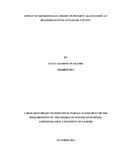| dc.description.abstract | Poverty reduction has been a major concern for successive governments in Kenya over the years because it is believed to be the universally accepted way of achieving economic growth in the country. The intended purpose is to raise the living standards of the people and improve upon their quality of life. The Kenyan government has been implementing polices to expand financial access to the poor including promoting microfinance credit access to the poor. Despite these programmes, about 48% of Kenyans still live below the poverty line. Microfinance programmes are increasingly publicized as one of the most successful tools for development with the ability to positively affect its participant’s economic and social status. However, the effect of access to microfinance credit in Kenya remains unknown. Based on this knowledge, the study sought to find out the effect of microfinance credit on poverty alleviation at household level in Nakuru County. The study employed descriptive research method. The population consisted households accessing microfinance credit in Nakuru County. Purposive sampling was to select households that were studied. The study used questionnaire to collect data which was then summarized, coded and tabulated and analyzed using SPSS version 21. Multivariate regression model was applied to determine the relative importance of each of the six variables (business expansion, housing and shelter, saving, expenditure on education, healthcare and better clothing) with respect to poverty alleviation. The results were tested using F-test, t-test, and ANOVA at 95% confidence level. The study found that microfinance credit access positively contributes to alleviation of poverty at household level in Nakuru County by providing finance access to low income earners, less educated and those in the informal sector which helps in expansion of business, acquisition of better residential places, and acquisition of education, health and improved welfare. The study also found that access to microfinance credit significantly increases household income and provide avenues for people to save. The study recommends that microfinance institutions to continuously improve their outreach to enable them reach more deserving low income earners in all Counties in Kenya and households education on use of finances obtained enhanced. | en_US |

